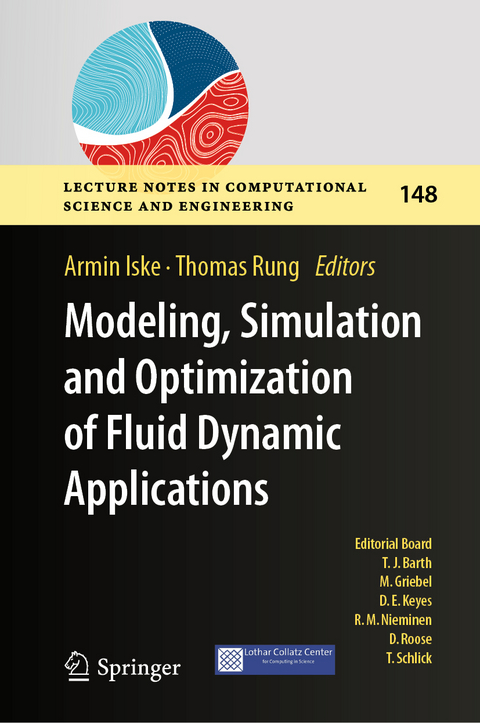
Modeling, Simulation and Optimization of Fluid Dynamic Applications
Springer International Publishing (Verlag)
978-3-031-45157-7 (ISBN)
The balanced research program is based on the guiding principle that mathematics drives applications and is inspired by applications. With this leitmotif the RTG advances research in Modeling, Simulation and Optimization by an interdisciplinary approach, i.e., to stimulate fundamental education and research by highly complex applications and at the simultaneously transfer tailored mathematical methods to applied sciences.
The reported research involves nine projects and addresses challenging fluid dynamic problems inspired by applied sciences, such as climate research & meteorology, energy, aerospace & marine engineering, or medicine. More fundamental research concerning analysis, approximation and numerics is also covered.
The material represents a successful attempt to exchange research paradigms between different disciplines and thus displays a modern approach to basic research into scientifically and societally relevant contemporary problems.
Armin Iske, an applied mathematician, has a long history of comprehensive experience in national and international research training networks and graduate programs, where he played a leading role in previous European Research Training Networks and in European Graduate and Exchange Programs. Armin Iske is the Scientific Coordinator of the Hamburg Lothar Collatz Center for Computing in Science. He is also editorial board member of five international mathematical journals, and he edited nine books (three as single author) on approximation theory and mathematical data analysis.
Thomas Rung, an engineer, has comprehensive experience in managing several larger national and international collaborative scientific programs which also involved training and supervision of graduate students. Moreover, he is managing research performed at one of Germany's biggest scientific computing center with some 200 running high-performance computing projects.
1. Lower Bounds for the Advection-Hyperdiffusion Equation.- 2. Modeling and Simulation of Parabolic Trough Collectors using Nanofluids.- 3. Adaptive DG Methods for 1D unsteady Convection-Diffusion Problems on a Moving Mesh.- 4. Anisotropic Kernels for Particle Flow Simulation.- 5. An Error-Based Low-Rank Correction for Pressure Schur Complement Preconditioners.- 6. Radon-based Image Reconstruction for MPI using a continuously rotating FFL.- 7. Numerical Simulation of an idealized coupled Ocean-Atmosphere Climate Model.- 8. Application of p-Laplacian relaxed steepest Descent to Shape Optimizations in two-phase Flows.- 9. Computing High-Order p-Harmonic Descent Directions and Their Limits in Shape Optimization.
| Erscheinungsdatum | 15.12.2023 |
|---|---|
| Reihe/Serie | Lecture Notes in Computational Science and Engineering |
| Zusatzinfo | VII, 163 p. 56 illus., 49 illus. in color. |
| Verlagsort | Cham |
| Sprache | englisch |
| Maße | 155 x 235 mm |
| Gewicht | 415 g |
| Themenwelt | Mathematik / Informatik ► Informatik |
| Mathematik / Informatik ► Mathematik ► Analysis | |
| Schlagworte | Aerospace • computational methods for climate research • Energy • Fluid Dynamics • Marine Engineering • meteorology • Modelling • Optimization • Simulation |
| ISBN-10 | 3-031-45157-0 / 3031451570 |
| ISBN-13 | 978-3-031-45157-7 / 9783031451577 |
| Zustand | Neuware |
| Haben Sie eine Frage zum Produkt? |
aus dem Bereich


